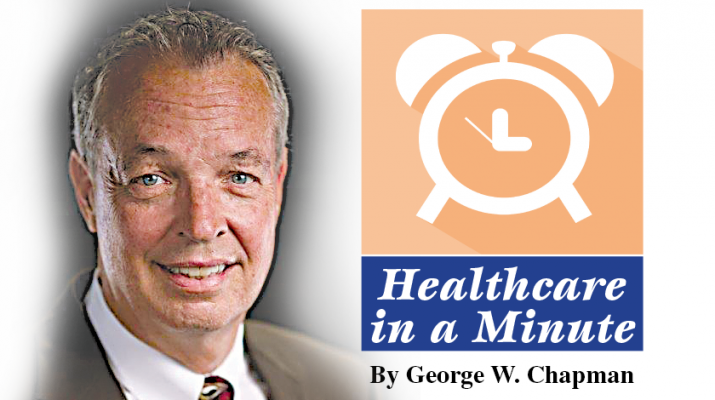By George W. Chapman
Insurance companies typically will not pay for procedures/treatment that they consider to be “experimental” or “investigational,” even in cases where the patient’s life is at stake. Recently, a jury awarded $25.5 million to the husband of a woman who died after being denied proton beam therapy to treat her brain tumor. The jury wanted to send a message to her insurer, Aetna, in what was called a “bad faith” case. Aetna’s “experts” argued the treatment was experimental while the plaintiff’s experts argued proton beam therapy is a well- established form of treatment and is paid for by Medicare. The couple mortgaged their home and raised over $90,000 through “Go Fund Me” to pay for treatment at a renowned cancer treatment center while suing Aetna, but it was too late and the patient died. The question is how does an individual insurance company eventually move treatments off their “experimental” list and on to their “approved” list? Proton beam therapy has been around for years. There is virtually no national oversight or agreement on what is considered to be experimental. It is left up to the insurer. A solution would be a panel of experts comprised of clinicians, payers and researchers empowered to determine what treatments are globally considered to be “experimental” and then which of them are either ineffective or approved for payment. There could be a federal fund established to pay for experimental procedures. How else will we know if the treatments are effective if people can’t afford to go through with them? Aetna could have treated almost 300 patients for the $25.5 million they shelled out for “bad faith.”
Insurance Administrative Costs
Our average administrative costs for health insurance are the highest in the world. The Affordable Care Act limits what commercial insurers can retain for profit and administrative costs to 15 percent of their premium. That means they must spend 85 percent of the premium on actual claims. If they spend less than 85 percent on claims they must refund the difference to their members. Medicare, purportedly, has the lowest administrative costs of all insurers at just over 1 percent. So, is “Medicare for all” a way to lower premiums for all? Skeptics argue the 1 percent is artificially low because: the IRS collects the taxes, Social Security collects the premiums, the FBI handles the fraud and then another seven federal departments also do work for Medicare. But Medicare’s annual report accounts for these costs. However, one third of Medicare eligible people are insured by private/commercial Medicare Advantage plans versus directly though Medicare. Including the administrative costs of these Medicare Advantage plans results in a combined 7 percent administrative costs which is much higher than Medicare’s 1 percent. Private plans average about 13 percent administrative costs, which includes profits.
Drug Ads on TV
No one really knows what drugs actually cost: manufacturers raise their prices to exorbitant levels to account for “discounts” given to pharmacy benefit managers; your out-of-pocket cost depends on your insurance plan; the same drug is cheaper in other countries. The Trump administration — CMS and DHHS — has vowed to control drug pricing or at least make it more transparent. Trump is proposing to require drug companies that sell drugs covered by Medicare and Medicaid to include their list price for covering a typical course of treatment in their ubiquitous TV ads. DHHS Secretary Alex Azar said, “We will not wait for an industry with so many conflicting and perverse incentives to fix itself.” CMS Administrator Seema Verma said, “We are committed to price transparency across the board and prescription drugs are no different.” The drug industry spends over $4 billion annually on TV ads. Of course the powerful drug lobby is pushing back and will challenge the policy in court arguing it violates their free speech. The drug lobby counters with providing language in their TV ads directing patients to online resources to determine what their cost would be. The AMA says this is a step in the right direction, but not a solution.
Affordable Care Act
There have been 70 attempts to repeal the astonishingly resilient ACA (Affordable Care Act) over the last 10 years. The last attempt to repeal was thwarted by the late Sen. John McCain’s “no” vote. Failing to repeal the law, the Trump administration started gutting the ACA by: reducing advertising 90 percent and navigator funding 40 percent; allowing states to reduce coverage for pre-existing conditions; terminating the individual mandate; changing basic coverage requirements; and basically just making it difficult for insurers to hang in the market places. A promised “much better plan” was never offered — 20 million people depend on the ACA for their insurance. Ironically, concerns over the most popular and basic tenet of the ACA — pre-existing conditions — probably cost Republicans the House. Democrats made it an issue and Republicans running for office claimed they were always in favor of it. Now, with the House under Democratic control, it will be interesting to see if the ACA is resurrected (and improved) rather than slowly bludgeoned to death.
NRA v. AMA
In addition to asking if you: exercise, smoke, drink excessively, use a seat belt, etc. to determine your health risks, your physician may also ask you if there are guns in the house. After the recent mass shootings, the AMA came out with a position paper calling gun violence a pubic health crisis. The NRA pushed back and told the AMA and several tweeting emergency room physicians to “stay in their lane.” The AMA is focusing on legislation that virtually prevents the Centers for Disease Control and Prevention from doing research on gun violence. As many as 35,000 of us die from gun violence each year and of that 21,000 are suicides.
George W. Chapman is a healthcare business consultant who works exclusively with physicians, hospitals and healthcare organizations. He operates GW Chapman Consulting based in Syracuse. Email him at gwc@gwchapmanconsulting.com.

